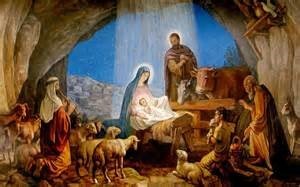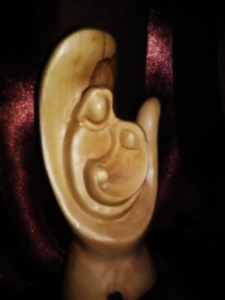Of course, that is the point of the song, isn’t it? Mary could never have guessed all that her child, hers yet God’s, would do. The exploits, the healing, the mastery of all powers earthly and heavenly, and the use of them all to love people whole and well. Then again, had Mary thought about what we so easily take for granted she might have guessed. After all, we’re talking about God—almighty, everlasting, creator, redeemer GOD. Had she thought as we now assume, she might well have expected many coming attractions filled with jaw-dropping exploits.
yet God’s, would do. The exploits, the healing, the mastery of all powers earthly and heavenly, and the use of them all to love people whole and well. Then again, had Mary thought about what we so easily take for granted she might have guessed. After all, we’re talking about God—almighty, everlasting, creator, redeemer GOD. Had she thought as we now assume, she might well have expected many coming attractions filled with jaw-dropping exploits.
But Mary’s mind, so far as we know, didn’t go there. Instead, Mary’s mind went to the familiar places all parental minds visit. How shall we care for this little one? What if he gets sick? What if there is an accident? How can we provide all he needs? Where and how shall he learn about life, about his/our God, and about why we are here in God’s world? What if the government turns more hostile? What if there is no work, no food, no place? What if …
Mary knew the unpretentious and ordinary village life of her people. She knew the talk that would swirl around her, usually out of range of her hearing, and the innuendo it conveyed. She knew the dangers of her world occupied as it was by pagan powers. She knew that no one would believe what God told her about her baby boy. She knew that Joseph loved her, but there was only so much a man could do. And Mary knew that God had visited her, called her, and given her this child, and she believed God would make good on the promise that came with the child. In this child, a savior had come. More, in this child somehow God had come. The name God told them to give him was Jesus, which means “Savior.” The name God gave him was Immanuel, which means “God with us.” Mary knew that heaven’s DNA nested within her womb and that or He signaled “salvation!”
But Mary didn’t know the details.
She didn’t know the how of it. If she had tried to guess, she would have got it wrong much of the time.
She didn’t know the when of it. If she thought about it, she may have assumed it would be sooner rather than later and, no doubt, would prefer and hope sooner.
She didn’t really even know much about it itself. I mean, what is the “salvation” that comes in this form? What does it mean to say and to believe that in the swaddling of this newborn she was comforting, warming, securing, and caring for a bundle of “God-with-us?”
She didn’t know what the Prophet Simeon was getting at either, though she would pondered it in her heart through the years. What could it mean for a sword to pierce her heart? And what would happen to her little one to cause the piercing?
Even with the passing of time, Mary often didn’t know. I am sure some of the wonderment receded as life happened, as Herod plotted and perpetrated his fearful atrocity, as they fled to become displaced persons, living for a time in Egypt where they didn’t belong—not only because they were citizens of another land but also because God had already delivered his people from that place. Now, strangely, here they were again, for a time, only now the place of former bondage was haven for the salvation of the savior himself.
Even with the passing of time and the growth of her boy physically, emotionally, socially and spiritually, Mary didn’t know. Whether at home with periodic bursts of unexpected words and deeds in the midst of an otherwise normal boyhood, or in the Temple asking questions and considering their answers—Mary didn’t know.
Even when her boy became a man and began to wander about making friends, talking about God and God’s ways as though he were Family, sharing and caring with people no one else did, somehow helping, healing, providing and provoking. Even with crowds swelling and controversy swirling, with celebration one day and conflict the next, Mary didn’t know.
Even on the final day when best friends betrayed or deserted him, and the most unthinkable things began to happen, and as it became clear how it would end—even as she understood the piercing predicted so many years before, still Mary didn’t know.
Even so, from Bethlehem onward there was at least one thing Mary did know. Her boy was God’s gift. Her boy was somehow God gifting the world in saving, healing, life-giving ways. Mary knew her boy, loved her boy, waited to understand her boy, followed her boy, trusted that the prenatal word about her boy was God’s word to her and to all. This Mary had always known. And it was enough.
Not only for her.


